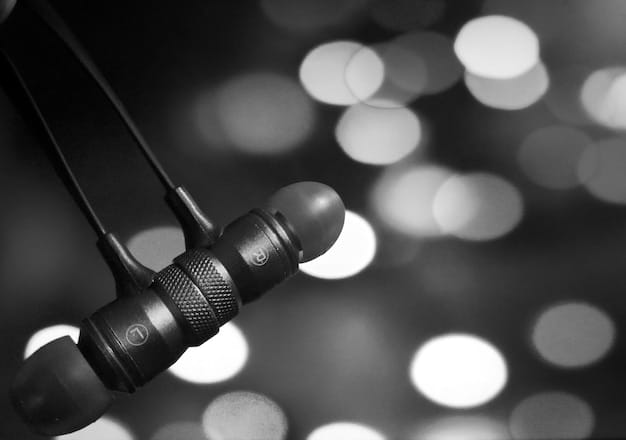Podcast Interview Etiquette: 10 Rules to Impress US Hosts

Podcast interview etiquette in the US involves understanding unspoken rules like respecting the host’s time, preparing thoroughly, engaging authentically, promoting the episode, and fostering a genuine connection to leave a lasting positive impression.
So, you’ve landed a spot as a guest on a podcast? Congratulations! But knowing the **podcast interview etiquette: 10 unspoken rules for guests to impress hosts in the US** is crucial to making a stellar impression and landing future invites.
Understand the Importance of Podcast Interview Etiquette
Being a guest on a podcast is a fantastic opportunity to share your expertise, connect with a new audience, and boost your brand. However, it’s not just about showing up and talking. It’s about understanding and adhering to unspoken rules that demonstrate respect, professionalism, and a genuine desire to contribute to the show’s success.
Podcast hosts dedicate significant time and effort to creating engaging content for their listeners. As a guest, your role is to complement their work, not undermine it. Proper etiquette shows that you value their platform and are committed to delivering a valuable experience for their audience. By following these guidelines, you can ensure a smooth, enjoyable interview process for everyone involved.
Why Etiquette Matters
Etiquette in podcast interviews extends beyond simple manners. It’s about building relationships and establishing a positive reputation within the podcasting community. A guest who demonstrates good etiquette is more likely to be invited back, recommended to other shows, and viewed favorably by listeners.
- Respect and Professionalism: Following etiquette shows respect for the host’s time, effort, and platform.
- Building Relationships: Good etiquette fosters positive relationships with hosts, leading to potential future collaborations.
- Enhanced Reputation: Guests known for their etiquette are more likely to be recommended and invited to other podcasts.
- Audience Connection: Listeners appreciate guests who are respectful and engaged, contributing to a better listening experience.
In short, mastering podcast interview etiquette is a key ingredient for success as a podcast guest. It demonstrates your commitment to excellence and respect, and it is an investment in your brand and relationships within the podcasting community.

Rule 1: Preparation is Key
Before even stepping into the virtual or physical studio, thorough preparation is paramount. This isn’t just about knowing your topic; it’s about understanding the podcast itself, its audience, and the host’s style.
Lack of preparation can lead to rambling answers, missed opportunities, and a general sense of unprofessionalism. Hosts can easily identify guests who haven’t done their homework, which reflects poorly on the guest and the host’s decision to invite them.
Research the Podcast
Start by listening to several episodes of the podcast. Get a feel for the tone, format, and topics typically covered. This will help you tailor your answers and contributions to fit the show’s style.
Familiarize yourself with past guests and recurring segments. This will give you insight into what works well on the show and what to avoid. Take note of the length of the episodes and the type of questions the host typically asks.
Know Your Audience
Understanding the podcast’s audience is just as crucial as understanding the podcast itself. What are their interests, demographics, and knowledge levels? Tailoring your content to resonate with the audience will make your interview more impactful.
- Demographics: Are they mostly young professionals, entrepreneurs, students, etc.?
- Interests: What topics are they passionate about? What problems are they trying to solve?
- Knowledge Level: Are they beginners in the field, or are they experienced professionals?
By understanding the audience, you can provide insights and stories that are relevant and engaging, making your interview a valuable contribution to the show. This ensures that you’re not just talking at the listeners, but connecting with them on a deeper level.
In conclusion, preparation is the cornerstone of a successful podcast interview. By researching the podcast, understanding the audience, and preparing your talking points, you can increase your chances of making a lasting impression and achieving your goals.
Rule 2: Respect the Host’s Time
Podcast hosts are often juggling multiple responsibilities, from booking guests to editing episodes. Being mindful of their time and adhering to agreed-upon schedules is a crucial aspect of podcast interview etiquette.
Disrespecting the host’s time can strain the relationship and create unnecessary stress. This includes showing up late for recordings, going over the allotted time during the interview, and failing to adhere to pre-arranged topics or guidelines.
Punctuality
Always arrive on time, whether the interview is in person or virtual. If you are running late, notify the host as soon as possible and provide an accurate estimate of your arrival time.
Arriving late not only disrupts the schedule but also shows a lack of respect for the host’s time and the time of any other participants. It can also create a sense of unease and rushedness, which can negatively impact the quality of the interview.
Adhere to the Time Allotment
Be mindful of the agreed-upon length of the interview and stick to it. If you have a lot to say, practice summarizing your points concisely.
- Practice concise communication: Get to the point quickly and avoid unnecessary rambling.
- Be aware of cues from the host: Pay attention to signals that the host may be trying to wrap up the interview.
- Offer a follow-up: If you feel you need more time, offer to provide additional information or resources after the interview.
Respecting the host’s time demonstrates your appreciation for their efforts and helps maintain a professional and harmonious working relationship. It shows that you value their time and are committed to making the interview a positive experience for everyone involved.
In conclusion, respecting the host’s time is a fundamental rule of podcast interview etiquette. By being punctual and mindful of the time allotment, you demonstrate respect, professionalism, and a genuine commitment to the success of the interview.
Rule 3: Be Authentic and Engaging
Audiences are drawn to authentic and engaging guests who can share their stories and insights in a compelling way. Being genuine and enthusiastic can make your interview memorable and leave a lasting impression.
Lack of authenticity can come across as disingenuous and undermine your credibility. Listeners can easily detect when a guest is simply regurgitating talking points or trying to promote themselves without genuine passion.
Share Personal Stories
Personal stories can help listeners connect with you on a deeper level and make your interview more memorable. Share anecdotes, experiences, and insights that illustrate your points and bring your personality to the forefront.
When sharing personal stories, be mindful of the audience and the context of the interview. Choose stories that are relevant, appropriate, and contribute to the overall message you are trying to convey.
Engage with the Host
Listen attentively to the host’s questions and respond thoughtfully. Avoid giving canned answers or going off on tangents unrelated to the topic at hand.
- Active Listening: Pay attention to what the host is saying and respond accordingly.
- Thoughtful Responses: Take a moment to consider your answer before responding.
- Relate to the Topic: Ensure your answers are relevant to the discussion.
- Show Enthusiasm: Let your passion for the topic shine through.

Being authentic and engaging not only makes your interview more enjoyable for listeners but also enhances your own credibility and authority. It demonstrates that you are genuinely passionate about the topic and committed to providing value to the audience.
In conclusion, being authentic and engaging is essential for a successful podcast interview. By sharing personal stories and engaging with the host, you can create a memorable experience that resonates with listeners and leaves a lasting positive impression.
Rule 4: Be Concise and Clear
In the world of podcasting, time is a precious commodity. Listeners want to hear valuable information without having to wade through unnecessary details or rambling stories. Being concise and clear in your communication is a sign of respect for both the host and the audience.
Being overly verbose can lose the audience’s attention and dilute the impact of your message. Rambling answers and unclear explanations can make it difficult for listeners to grasp your key points.
Focus on Key Points
Before the interview, identify the key points you want to convey. Structure your answers around these points and avoid getting sidetracked by tangents or irrelevant details.
Keep your answers focused and to the point. Use clear and simple language, avoiding jargon or technical terms that may not be familiar to the audience. Provide concrete examples and actionable insights to make your points more impactful.
Practice Summarizing
Practice summarizing complex concepts or ideas into concise and easily digestible statements. This skill is invaluable during a podcast interview when you need to convey information quickly and efficiently.
- Identify the Core Message: Determine the central idea you want to communicate.
- Use Simple Language: Avoid technical terms or jargon that may confuse listeners.
- Provide Concrete Examples: Illustrate your points with real-world examples.
By being concise and clear in your communication, you demonstrate respect for the audience’s time and make your interview more valuable. Your ability to provide succinct and insightful answers will impress the host and leave listeners wanting more.
In conclusion, conciseness and clarity are vital elements of podcast interview etiquette. By focusing on key points and practicing summarizing complex ideas, you can make your interview more impactful and demonstrate respect for the host and the audience.
Rule 5: Promote the Episode
One of the most appreciated gestures a podcast guest can make is to actively promote the episode after it goes live. This not only helps the podcast gain more exposure but also demonstrates your commitment to the host and their platform.
Failing to promote the episode can be seen as a missed opportunity to support the host and reach a wider audience. It suggests a lack of engagement and can strain the relationship between guest and host.
Share on Social Media
Share the episode on all your social media channels, including platforms like LinkedIn, Twitter, Facebook, and Instagram. Tag the host and the podcast in your posts and encourage your followers to listen.
Craft engaging and attention-grabbing captions that highlight the key topics discussed in the episode. Use relevant hashtags to reach a broader audience and increase visibility. You might also consider sharing snippets or quotes from the interview to pique people’s interest.
Link on Your Website
Feature the podcast episode on your website or blog. Write a brief summary of the interview and include a direct link to the episode on the podcast’s platform.
- Increase Website Traffic: Drive traffic to your website and offer potential clients a taste of your knowledge.
- Show Appreciation: Demonstrate your gratitude towards host and build strong working relationship.
- Build Credibility: Establish yourself as a subject matter expert and increase your professional reputation.
By actively promoting the episode, you not only support the podcast but give your social networks helpful content. This simple act is a sign of good etiquette and demonstrates your commitment to the host and their platform.
In conclusion, promoting the episode is a crucial aspect of podcast interview etiquette. By sharing on social media and linking on your website, you can amplify the reach of the podcast and demonstrate your support for the host.
Rule 6: Send a Thank You Note
In the digital age, where communication is often quick and impersonal, sending a thank you note is an important rule for guests to impress hosts. A simple thank you note, whether an email or a handwritten letter, goes a long way in showing appreciation for the host’s time and effort.
Failing to express gratitude can come across as unappreciative and strain the relationship. A thank-note is a critical part of a good podcast interview.
Express Gratitude
Take the time to write a personalized thank you note to the host after the interview. Express your gratitude for the opportunity to be on their show and mention something specific you enjoyed about the conversation.
A personalized thank you note demonstrates that you value the host’s time and effort. It can include a reference to a specific aspect of the talk, and it shows respect in a manner that helps keep the relationship positive.
Keep it Brief
Your thank you note doesn’t need to be long or elaborate. A brief and heartfelt message is all that’s needed to convey your gratitude.
- Express Sincere Thanks: Start by expressing your genuine appreciation for the host’s time and effort.
- Mention a Specific Moment: Highlight a particular moment or topic from the conversation that you enjoyed or found valuable.
- Offer Continued Support: Let the host know that you’re open to future collaborations or opportunities.
By sending a thank you note, you reinforce your positive impression and strengthen your relationship with the host. This simple gesture shows that you value their time, effort, and platform, which increases your visibility.
In conclusion, sending a thank you note is an essential element of good podcast interview etiquette. In a thank-you note, show how much you appreciate the host in a manner that helps keep the relationship positive.
| Key Point | Brief Description |
|---|---|
| ✅ Preparation | Research the podcast, audience, and prepare talking points. |
| ⏱️ Respect Time | Be punctual and adhere to agreed-upon schedules and time allotments. |
| 🗣️ Authentic Engagement | Share personal stories and engage thoughtfully with the host. |
| 📢 Promotion | Share the episode on social media and your website to support the host. |
FAQ
▼
Podcast interview etiquette is important because it demonstrates respect for the host, builds relationships within the podcasting community, and enhances your professional reputation. Adhering to these guidelines ensures a smooth interview.
▼
Prepare by thoroughly researching the podcast, understanding its audience, and identifying key talking points pertinent to the show’s themes. This ensures your contributions are relevant and can engage the listeners effectively.
▼
If running late, notify the host immediately and provide an accurate estimate of your arrival time. Prompt communication shows respect and allows the host to make necessary adjustments to the schedule.
▼
Promote the episode by sharing it on social media platforms, tagging the host and podcast, and including a link on your website or blog. If appropriate, send it via email to a list.
▼
Sending a thank you note expresses gratitude for the host’s time and demonstrates professionalism. A personalized note reinforces your positive impression and strengthens your relationship with the host, fostering future opportunities.
Conclusion
By following these unspoken rules of podcast interview etiquette, you can significantly enhance your presence as a guest and create lasting positive impressions. Remember, these rules are about showing respect, building relationships, and adding value to the podcasting community, which will ultimately benefit you and the hosts with whom you collaborate.





